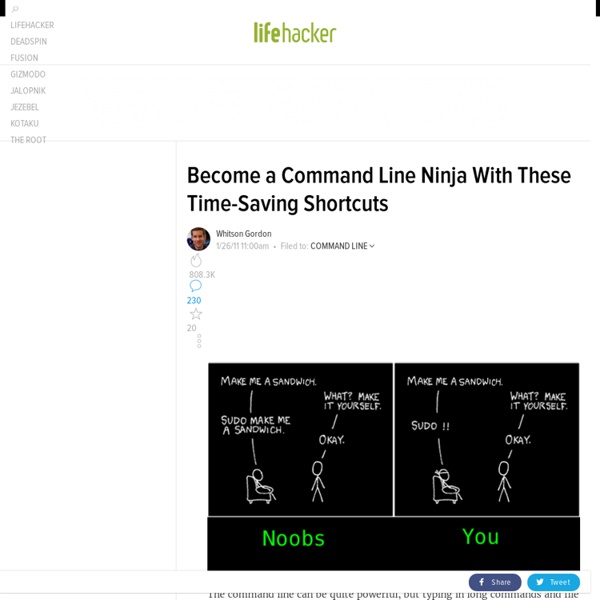Find is a beautiful tool
I have blogged before that knowledge of command-line tools is essential to take the next step in programming productivity. I think it would be useful to provide simple tutorials for these powerful tools, starting with find. Tutorial If you’re on Windows, I would recommend installing Cygwin to bring the power of a real shell to your OS. Let us start with a simple example and build upon it:
A Command Line Primer for Beginners
It is a simple fact that probably better than 95% of the system adminning under both Linux and Windows can be done from the command prompt. Fortunately for the safety and security of your system, there are no fancy GUI's with extensive, context sensitive help available for them. ...and those of us who know how a number of them work, won't tell you. You're welcome. For myself, I am a power user.
A Short Guide To Customizing Ubuntu 12.04 LTS (for Beginners)
Good guide! Personally I despise Unity, so I am running Ubuntu 13.04 Gnome Edition, which comes with gnome 3, and is awesome! That is one of the perks of using Linux, if you do not like something, boom drop that and grab another. And also it is very easy to do that. That is one of the main attraction of Linux.
grep is a beautiful tool
Global Regular Expression Print is a staple of every command-line user’s toolbox. As with find, it derives a lot of power from being combined with other tools and can increase your productivity significantly. Following is a simple tutorial that will help you realize the power of this simple and most useful command.
64 Things Every Geek Should Know - LaptopLogic.com
The term ‘geek’, once used to label a circus freak, has morphed in meaning over the years. What was once an unusual profession transferred into a word indicating social awkwardness. As time has gone on, the word has yet again morphed to indicate a new type of individual: someone who is obsessive over one (or more) particular subjects, whether it be science, photography, electronics, computers, media, or any other field. A geek is one who isn’t satisfied knowing only the surface facts, but instead has a visceral desire to learn everything possible about a particular subject.
Linux 101: Using chmod and chown
When you use Linux long enough you are going to use the command line. Although nearly every command line trick can be done from a GUI front end now, there are times when the command line is the only route (headless server for example). When you have to go that route, you will be glad to have the fundamentals of the more important Linux commands under your belt. Two very important commands, chmod and chown, deal with permissions and ownership (respectively). With these tools you control who owns and who reads, writes, and executes files and folders on your Linux system. Let's take a look at how to use these commands.
Hack Passwords Using iStealer ~ Defend Hackers, Secure The World
There are diffirent way's to steal passwords. I want to be able to steal passwords from cookie files with 1 click, well what do you know it exists! It's a cookie stealer called iStealer ( 6.0 is newest version ). It steals every cookie password from the slave's browser, and shows it to the attacker.So if you do it correctly you will have hotmail, netlog, facebook, WoW, rapidshare and other passwords from lots of people in no time.
Pack for Linux: Our List of the Best Linux Downloads
GNOME Do - uses mono, a .NET clone. No chance. I could be wrong. LibreOffice - You Bet! gedit - meh.



